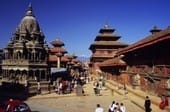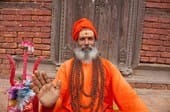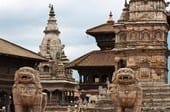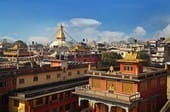TEFL Certification Kathmandu | TEFL Nepal
nepal, birthplace of the Buddha, truly is a special place. Nestled along the uniquely impressive and world-renowned Himalayan mountain range, Nepal is a mystical country of warm-hearted people, time-worn temples and an incredibly diverse geography. Its landscape is incredible, boasting some of the best walking trails on the planet. Although Nepal isn’t particularly well-off in financial terms, the country’s welcoming and friendly people, landscape, traditions, religions and culture all culminate; for many, one visit is simply not enough.
From the awe-inspiring Himalayas to the lush green national parks, the countless temples and pagodas to the bustling markets, street sellers, and clubs and bars of Kathmandu, Nepal has something for everyone, and for most visitors to Nepal, something about its scenery, people, traditions or culture lingers with them long after they've moved on.
Eight out of ten of the world's highest peaks are found in Nepal, including the world's highest - Mount Everest, at 8850 meters. Nepal is the top of the world!
The tefl international TEFL course in Nepal is in Kathmandu. With a population of half a million people, Kathmandu is Nepal's biggest and most cosmopolitan city, a meeting place of a dozen ethnic groups, and the home town of the Newars, Nepal's master craftsmen and traders extraordinaire. It was trade that created Kathmandu, and for at least a thousand years it controlled the most important caravan route between Tibet and india. No wonder perhaps, that Kathmandu has so completely embraced the tourist business.
Tradition says that old Kathmandu was laid out in the shape of a khukuri knife. Positioned at what would be the hilt of the knife is Durbar Square - a relentless carnival set amidst temples, monuments and the Fonner royal palace while the city's oldest neighborhoods stretch northeast and southwest. New Road, the city's best-known shopping street, runs east from the square. Kathmandu's budget hotels are concentrated in two areas: Thamel, north of Durbar Square in a new part of town, and Jhochhen, (better known as Freak Street!), immediately south of the square.
Suburban Kathmandu sprawls mainly east of Kantipath, the main north-south thoroughfare, and is dominated by two landmarks, the Royal Palace and the Tundikhel (parade ground) .Most of the expensive hotels, restaurants and airline offices huddle together along Durbar Marg, the broad boulevard running south from the palace gate. West of the Bishnumati River is not, strictly speaking, part of Kathmandu, but the hilltop temple of Swayambhu is close enough to be reached easily on foot.
You certainly won’t be short of ideas for weekend activities, or onward travel, either before, during or after your TEFL course in Nepal:
- Kayaking, rafting, canyoning, climbing, mountain biking, or trekking
- Visit the world's largest stupa in Bouddha, the religious centre of Tibetan exiles living in Nepal, and Nepal's most important Hindu temple, Pashupatina
- Head for the hills and enjoy mountain views at Nagarkote or Dhulikheal
- Take a mountain flight and get a spectacular view of the Himalayas
- Village home stay: Visit the village, spend time with the villagers, have lunch and dinner, stay in a traditional village home, visit a school the next day
- Patan - wander the streets and stumble across some of Patan's 600 stupas and 185 bahals (Buddhist monasteries), watch handicrafts being made, visit Durbar Square, the Royal Palace, Patan Museum or the zoo
- Kathmandu - explore the Old City, markets, Durbar Square, the Royal Palace, the National Museum, Swayambhunath (monkey temple), see Tibetan carpets being made
- Kirtipur - enjoy a traditional Newari food and music experience and mountain views
- Bhaktapur - wander the cobble-stoned streets of this timeless, traffic free town and peruse the many handicrafts on offer
- Take a yoga or meditation class, or learn about Tibetan Buddhism
The School
The TEFL training centre in Nepal is situated in Central Kathmandu. The TEFL school is complete with classrooms and all the facilities that you will need during your TEFL course, with hot and cold water on hand for drinks. There's a little tea-shop downstairs that makes simple Nepali meals, plus a wide range of local shops and restaurants nearby.
Accommodation
We can book accommodation for you in our preferred hotels in Kathmandu. You are, of course, more than welcome to make your own accommodation arrangements.
Accommodation is available at a range of prices, according to the standard of hotel and the type of room you prefer. Prices for a Basic Option hotel start at around $407 per month (for a single, non-AC room). Prices for a Standard Option hotel start at $559 per month (for a single, non-AC room). Please note that these prices exclude government taxes and service charges.
Typically, a room in either a Basic or Standard Option hotel will have single, double or twin beds, a wardrobe, a small desk, and a private bathroom with shower. Some rooms may have a TV. All rooms have hot water. The difference between the Basic and Standard options is predominantly the facilities the hotel offers, and the general standard of the hotel, although we are happy with the cleanliness and standard of all hotels we accommodate you in.
All hotels have a restaurant, room service, laundry, room cleaning, and all have at least one outside space area (a garden, balcony, or roof terrace). Some have internet services and Wi-Fi. Your Course Administrator will send you all these details.
Some of the accommodation is a 15 minute walk from the centre. Some hotels are a little further away - about a 30 minute walk. Book early to get the hotel of your choice!
Course dates
 Coming soon...
Coming soon...
Please check out our other course locations if you wish to attend a course before this one becomes available...
Course fees
The total price is divided into: deposit and balance.
The deposit may be paid via a) credit card b) Paypal c) wire transfer d) Western Union.
The balance of the course fee must be paid by cash, PayPal or bank transfer directly to the training center on the first day of the course.
US$ 600
US$ 890
Accomodation Fees
The accommodation fees are not part of the course price and you are free to choose whichever accommodation option you prefer.
If you choose to use our accommodation, it should be paid for either by cash, PayPal or bank transfer directly to the school at the start of the course.
US$ 407
special price on offer from









